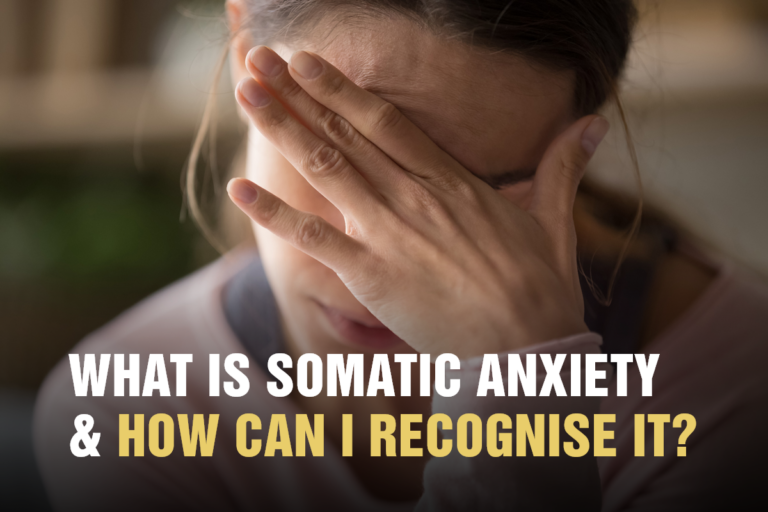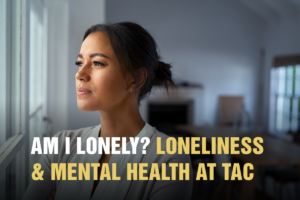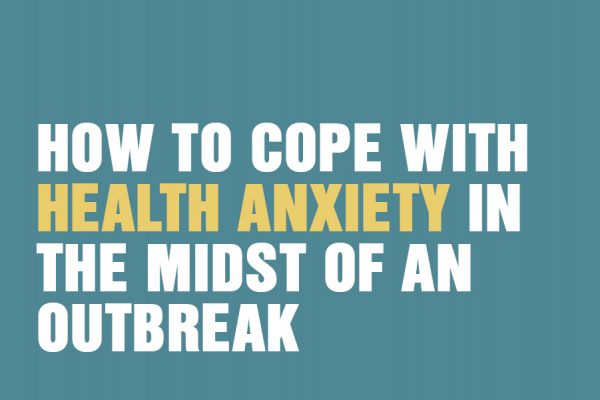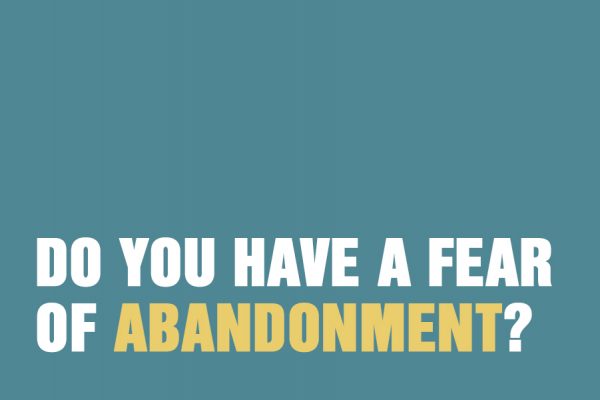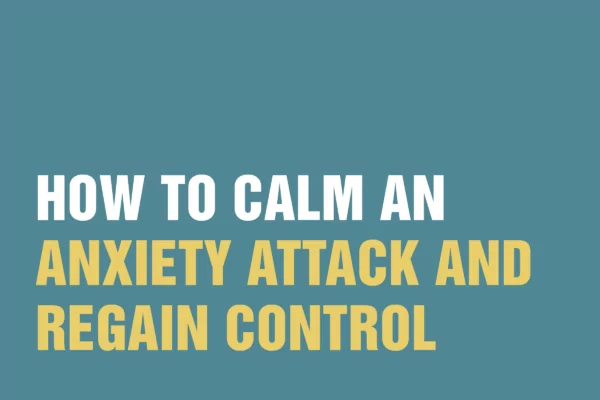Somatic anxiety, otherwise known as somatic symptom disorder or somatization disorder, is one of the psychiatric disorders that fall under the general grouping of anxiety.
The word ‘somatic’ is rooted in the Greek ‘sōmatikos’, meaning ‘of the body.’ Therefore, people dealing with somatic anxiety disorders experience the symptoms of anxiety primarily as somatic symptoms; their anxiety manifests itself in a physical way, such as a stomachache, headache or sweating, for example.
This differs from cognitive anxiety, where the challenges and symptoms of anxiety present themselves chiefly in a psychological sense; that is, within the brain, as thoughts, feelings, urges and emotions. However, people who are facing somatization disorder may experience both cognitive and somatic symptoms.
In this blog post, we’ll take a look in more detail at the health concerns and key differences between somatic and cognitive anxiety, and consider related mental health disorders. We’ll then move on to some signs to look out for if you’re concerned you or a loved one is dealing with somatic anxiety, suggesting a few ways you can help to manage the issue, and recommending pathways to treatment if you’re considering seeking clinical support.
Somatic Symptom Disorder vs Cognitive Anxiety
Both somatic symptom disorder and cognitive somatic anxiety are classed as mental health issues, where chemical reactions inside the brain alter or impair ‘normal’ functioning, with challenging or unwelcome consequences.
The key difference is in the manifestation of the symptoms; where somatic anxiety tends to find an outlet in the body, with symptoms expressed physically, cognitive anxiety symptoms more typically occur within the brain.
Unlike somatic symptom disorder, cognitive anxiety symptoms might include:
- Depersonalisation
- Negative thoughts
- Fear and unease
- Concentration difficulties
- Panic attacks
According to the fifth edition of the Diagnostic and Statistical Manual 5 (DSM-5) and American Psychiatric Association, a person who is dealing with anxiety can simultaneously experience both physical and psychological symptoms, although one or the other will tend to be more prevalent.
It’s important to note that neither cognitive nor somatic anxiety can be diagnosed in the case of medically unexplained symptoms. Both disorders are recognised as distinct mental health disorders and types of anxiety in themselves, not as ‘catchall’ or ‘fallback’ diagnoses, and there are a number of clinically-backed ways you can help support someone with anxiety.
Many clinicians draw a link between cognitive and somatic anxiety and other psychiatric disorders. For instance, illness anxiety disorder (or health anxiety) is identifiable as a person being excessively worried that they are sick, or about to become seriously ill; you may have heard of this condition under the name hypochondriasis. Equally, the APA recognises somatic anxiety as medically related to conversion disorder (or functional neurological symptom disorder, where symptoms affect a person’s movement, perception and senses), and factitious disorder (where patients essentially fabricate, ‘fake’ or overplay the severity of an illness).
Diagnosing the Physical Symptoms of Somatic Anxiety
Though a person may experience both cognitive and somatic symptoms of anxiety, both issues present a clearly-defined cluster of typical symptoms (see above for some of the regularly-observed symptoms of cognitive anxiety). As defined by the American Psychiatric Association, the physical symptoms that may be brought about by somatic anxiety include:
- Intense, often sudden nausea
- A stomachache
- Uncontrollable shaking in the body
- Profuse sweating
- A racing heart
- Hyperventilation or intense breathing
- Tight muscles and tension in one or more muscle groups
- Aching in one or more groups of muscle
- A dizzying or painful headache
Following the proposal that anxiety could be split into physical or psychological symptoms, the Cognitive-Somatic Anxiety Questionnaire (CSAQ) was drawn up. This is a medical survey which aims to quantify and categorise symptoms, as a way of helping determine which type of treatment a person should receive. With that said, there are many critics of the CSAQ, who argue that it is inconsistent and ineffective in its diagnosis.
Furthermore, while some clients who followed a treatment plan recommended by the CSAQ showed a marked improvement and recovery, the results seen in other clients have called into question the validity or thoroughness of the CSAQ.
5 Ways to Help Yourself Face Somatic Anxiety
Somatization can be an unwelcome and challenging experience for a person to face. It may be triggered seemingly at random and take hold quickly, with profound physical outcomes that can severely impact your life. Sometimes, it’s difficult to explain what’s going on, and friends and loved ones can struggle to truly understand the issue. This can lead to feelings such as shame, doubt, embarrassment and fear, which may contribute to and feed into prolonged anxiety.
However, here at TAC, our team of psychologically-trained clinical experts in anxiety disorders has put together a useful guide of 5 self-help coping strategies you can use to help quell the symptoms of somatic anxiety when they occur, and assist you in regaining a calm and balanced state.
1. Take deep breaths
Mindful breathing is a well-known and often-recommended coping technique for a wide variety of conditions, and with good reason. Somatic anxiety can drastically affect your normal breathing pattern, which only exacerbates other symptoms. Aim to regulate your own breathing, by drawing air from your nose deep into your belly, and breathe out through your mouth – 5 seconds in, 7 seconds out. Calming your breathing will help you to soothe and take back control of your body.
2. Practise sense mindfulness
One of the most challenging aspects of somatic anxiety is that it seems to hijack your senses, seizing control of them away from you. If you feel this starting to happen, it can be a useful strategy to engage all 5 senses in a calmer way. Get into the habit of using the ‘54321’ technique of mindfulness:
- 5 – find 5 things to look at in your immediate environment
- 4 – open your ears to 4 things you can hear around you
- 3 – identify 3 things you can feel on your body
- 2 – try to pick out 2 things you can smell
- 1 – focus on discovering 1 thing you can taste at that moment
3. Relax stressed muscles
If you feel one or several muscles starting to tighten, it’s important to try and relax them, as this will help you stay grounded and calm. If you can identify where your body is becoming tight, focus on relaxing that area. If you’re struggling to identify which specific muscles are under stress, aim for a full-body relaxation. Starting with your toes, then feet, then legs and so on, alternately engage and loosen the muscles, creating a holistic muscular relaxation.
4. Give yourself ‘a butterfly hug’
Cross your arms over your chest so that both sets of fingers touch your collarbone, just like you’re giving yourself a hug. Then, with eyes open or closed, slowly ‘flap’ your hands like the wings of a butterfly. Keep that calming rhythm, and focus on deep and mindful breathing, and you should soon start to feel your symptoms subside.
5. Step out into the great outdoors
Nature is well-known to have a significantly beneficial impact on our mental health, and surrounding yourself with green or blue spaces can also help to soothe the challenging symptoms of anxiety. Even something as simple as going for a walk can have a dramatic effect; not only is light exercise and fresh air good for you physically, the meditative act of placing one foot in front of the other gives you the peace of mind to regain a calm, balanced state.
A Helping Hand for Anxiety Symptoms and Mental Disorders
If the symptoms of an anxiety disorder, or any other mental health issue, start to become overwhelming, it’s important to find the right sources of guidance and support to see you through.
The Awareness Centre has a professional team of over 300 knowledgeable and experienced therapists, meaning we can help you find the perfect therapeutic match to assist you in dealing with your issue. All our therapists are clinically-trained and understanding individuals, who can provide a warm and safe space for you to discuss your symptoms and recommend the most effective avenues of treatment.
To request an appointment with TAC, get in touch now or give us a call on 020 8673 4545.

